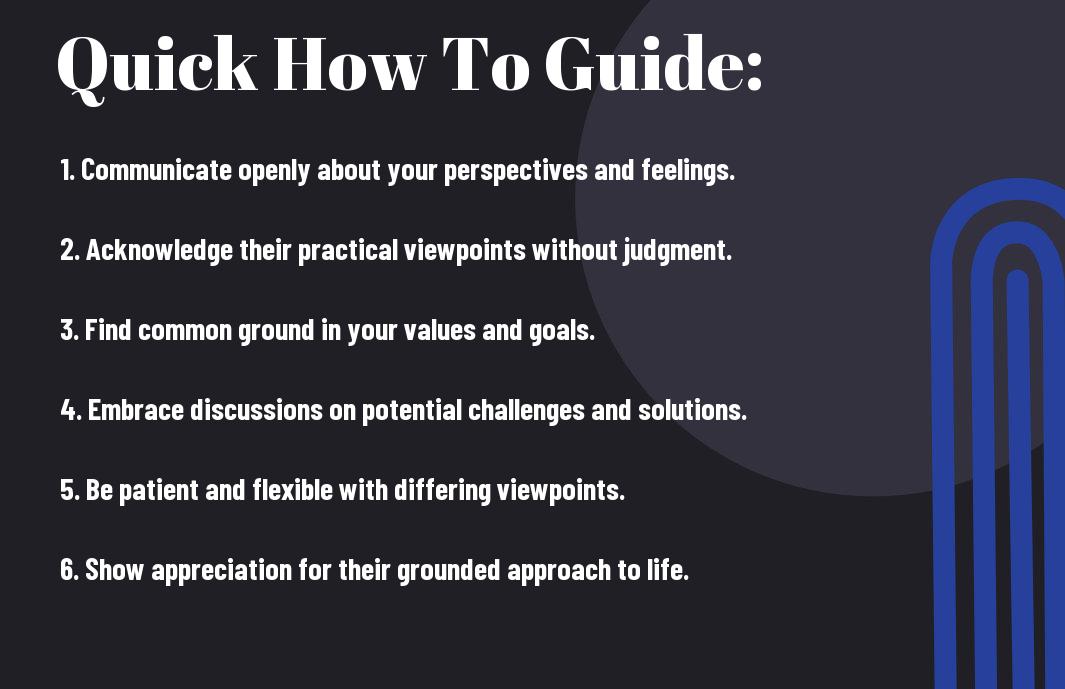Many people find themselves in relationships with individuals who have a pragmatic outlook on life. Dating someone who’s a realist can present unique challenges, as their no-nonsense approach often contrasts sharply with more optimistic perspectives. Understanding their viewpoint and adapting your communication style can enhance your connection and lead to a healthier relationship. In this post, you’ll learn effective strategies to navigate these differences, embrace your partner’s realism, and create a balanced dynamic that appreciates both your dreams and their grounded insights.
Understanding Realism in Dating
To navigate a relationship with someone who embodies realism, it’s necessary to grasp their perspective. Realists tend to approach dating with a clear-eyed view of life, prioritizing practicality and truth over idealism. This understanding can help you establish a more meaningful connection by aligning your expectations with theirs, ultimately leading to healthier communication and compatibility.
Defining Realism
Assuming you’re familiar with the concept, realism can be defined as a mindset that emphasizes accepting situations as they are, rather than how you wish they could be. In dating, this means that your partner may not entertain grand romantic gestures or unrealistic fantasies, choosing instead to focus on facts and tangible outcomes within the relationship.
Common Traits of Realists
One hallmark of realists is their practicality, often viewing relationships through a lens of logic and reasoning. They may express skepticism towards overly romantic notions and prefer grounded conversations about the future, compatibility, and mutual goals.
With this practical perspective, realists are often excellent problem solvers, focusing on finding solutions rather than drifting into emotional turmoil. They value honesty and transparency, which can foster a strong foundation in your relationship. While it may take some adjustment on your part, engaging with their pragmatic viewpoints can enrich your bond and lead to a more profound understanding of each other.

Tips for Communication
One effective way to communicate with a realist partner is to establish clear and concise dialogue. Here are some tips to enhance your conversations:
- Be direct about your feelings.
- Use specific examples to illustrate your points.
- Avoid vague statements or assumptions.
- Encourage questions to clarify misunderstandings.
- Practice patience and empathy.
Thou can create a more harmonious relationship through thoughtful communication.
Open and Honest Conversations
Assuming your partner appreciates transparency, initiate discussions that allow both of you to express feelings without fear of judgment. Share your thoughts about future plans and expectations, making sure to validate their perspective. Building this foundation of openness fosters trust and understanding.
Active Listening Techniques
Honest communication isn’t just about speaking; it also involves listening attentively. Implement active listening techniques to show that you value your partner’s viewpoint. This means giving your full attention, nodding to acknowledge understanding, and summarizing their points to ensure clarity.
Another effective technique is to ask open-ended questions that encourage deeper exploration of their thoughts. Avoid interrupting, and instead, let them take their time as they articulate their ideas. By doing so, you’re not only reinforcing the importance of their input but also demonstrating your commitment to mutual understanding.

Balancing Optimism and Realism
Unlike an overly optimistic viewpoint, a realist perspective helps ground expectations and decisions in practicality. When dating someone with a realistic approach, it’s necessary to find a balance between your hopeful outlook and their focus on what is attainable. Engaging in open conversations about your dreams and their possible realities can create a space for both perspectives. It’s about embracing the strengths of both viewpoints to foster a healthier relationship.
Acknowledging Differences
If you find that your partner leans towards realism while you embrace optimism, acknowledging these differences can be empowering. Recognizing that both perspectives hold value is the first step in enhancing your relationship. Assess how each view can complement the other and foster mutual respect, ultimately leading to better understanding and connection.
Finding Common Ground
Common interests and goals can serve as the foundation for bridging the gap between optimism and realism in your relationship. Focus on shared values and beliefs that reflect both your dreams and your partner’s practical evaluations. By doing so, you can create a space where both perspectives are valued and respected.
With open dialogues about your aspirations and your partner’s realistic assessments, you can work together to establish achievable goals. Consider discussing your individual hopes while also being receptive to the practical considerations your partner offers. This collaboration not only strengthens your bond but also develops a shared roadmap for the future that honors both your optimistic spirit and their realistic approach.
Managing Expectations
After commenceing on a relationship with a realist, it’s important to manage your expectations effectively. Realists thrive on honesty and practicality, so it’s important to communicate openly. You can read more about What It’s Like Dating A Realist to help you navigate these dynamics. By understanding their perspective, you can foster a deeper connection while ensuring both of you remain aligned in your relationship goals.
Setting Realistic Goals
The foundation of a healthy relationship with a realist lies in setting realistic goals together. This involves discussing your aspirations, both individually and as a couple, while being mindful of each other’s limitations and life circumstances. By sharing your ambitions and coming to a mutual understanding, you can cultivate a strong partnership built on achievable milestones.
Accepting the Unpredictable
There’s a level of unpredictability in every relationship, and accepting this can be especially important when dating a realist. Your partner may have a practical outlook, but life has its own plans. Embracing uncertainty can enhance your bond and encourage flexibility, which is vital for navigating challenges together.
For instance, unexpected events or changes in plans can arise that may not align with your ideal scenario. Realists will likely respond to these situations with practicality, focusing on solutions rather than dwelling on disappointments. By adopting a similar mindset and accepting that you cannot control everything, you can strengthen your relationship and adapt more comfortably to life’s surprises.
Support and Encouragement
Many people might not realize the importance of being a supportive partner when dating a realist. Your encouragement and understanding can help them navigate the complexities of their views while also creating a balance in your relationship. By actively promoting an environment where they feel valued and understood, you can foster open communication and emotional growth together.
Being a Source of Stability
Even though your partner tends to approach situations with a pragmatic mindset, your role as a source of stability can significantly enhance your relationship. By demonstrating consistency and reliability in your actions, you create a safe space for them to express their thoughts and feelings. This stability allows for deeper connections and helps them feel more secure in the partnership.
Encouraging Positive Thinking
Assuming that your partner appreciates a realistic view of life, you can gently encourage them to embrace moments of positivity. Highlighting the bright side of situations doesn’t mean disregarding their perspective; it reinforces their resilience and adaptability in facing life’s challenges.
For instance, when your partner faces setbacks at work or in personal pursuits, you can help them see the lessons learned and potential opportunities that arise from these experiences. Sharing stories of successful individuals who have overcome obstacles can illustrate that while being realistic is vital, a positive outlook allows for personal growth. By fostering this optimistic perspective, you empower your partner to balance their realism with hope and confidence in future possibilities.
Recognizing Relationship Growth
Now that you are navigating the complexities of dating a realist, it’s imperative to recognize the signs of growth in your relationship. Understanding how both you and your partner evolve together can help solidify your connection and strengthen your bond. Look for moments of open communication, mutual support, and shared goals, as these are often indicators of a flourishing partnership.
Signs of Positive Change
Change often manifests in subtle ways; perhaps your discussions have become more constructive, or you find yourselves more aligned in your values and aspirations. These moments can signal that you both are adapting and growing together, fostering a healthier dynamic. Celebrate these shifts as they mark significant progress in your relationship journey.
Evaluating Relationship Progress
With each passing day, it’s important to take a step back and evaluate the progress of your relationship. Are you both more receptive and understanding of each other’s viewpoints? Assessing these aspects will give you insights into how far you’ve come and where you need to go.
This evaluation isn’t simply about identifying what has changed; it involves reflecting on your emotional climate, communication styles, and problem-solving approaches. Take time to honestly discuss any challenges you’ve faced together and how you’ve navigated them. This open dialogue will not only foster trust but also help you appreciate the growth of your relationship as it unfolds. Look for evidence of compromise, resilience, and respect as markers of the positive transformation taking place between you and your partner.
Conclusion
So, handling a relationship with someone who is a realist involves embracing open communication and understanding their perspective. You should be prepared to discuss your feelings and expectations candidly while respecting their practicality. Acknowledge their views without dismissing them, and work together to find common ground. This approach not only strengthens your bond but also fosters a balance between optimism and realism. By doing so, you can cultivate a healthy and fulfilling relationship that honors both your viewpoints.










